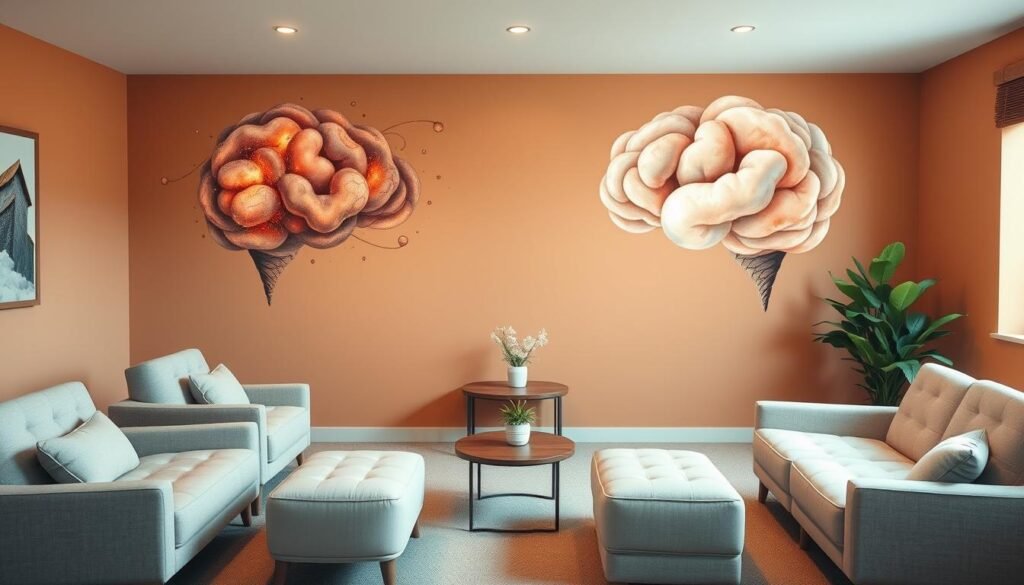Did you know, from 2005 to 2016, teens with major depressive episodes increased from 9% to about 13%? This rise shows the critical need for effective treatments for adolescent depression. Understanding medication options is key for parents and caregivers. Nowadays, depression greatly affects our youth’s mental health. Yet, only 40% of these young people get the help they need, despite 70% facing severe challenges.
This guide aims to support parents through the maze of depression medication for teens. It’s important to know how to spot depression, understand its causes, and find the right treatment. Families equipped with knowledge can offer better support to their loved ones. For more details, check the Parents’ Medication Guide by the American Academy of Child and Adolescent Psychiatry.
Key Takeaways
- Adolescent major depressive episodes increased from 9% in 2005 to 13% in 2016.
- Severe impairment affects up to 70% of youths suffering from depression.
- Only about 40% of affected adolescents receive treatment each year.
- Suicide remains the second leading cause of death among individuals aged 10 to 24.
- Effective treatment often includes both medication and psychotherapy options.
Understanding Adolescent Depression
Adolescent depression is a big health issue that impacts many teens. Up to one in five teens may face it during their teenage years. Knowing the symptoms of teen depression and spotting the early warning signs are key. Family support plays a big role in helping teens get the help they need.
Symptoms of Depression in Teens
Teens with depression might always seem sad, irritable, or angry. They might also:
- Complain about pain with no clear cause
- Stop liking activities they used to enjoy
- Change how they sleep and eat
- Use drugs or act recklessly
- Avoid friends and social events
If a teen is using substances, they might think about suicide. It’s vital for those caring for them to notice these signs. They should then look for the right adolescent depression treatment without delay.
Causes and Risk Factors
The causes of teen depression are complex. They include genetics, bullying, health issues, and stressful events. Social media can also play a part. Too much of it can make teens feel left out and bad about themselves.
Other key risk factors for teen depression include:
- Not having enough support
- Family issues
- Struggling in school
- Using alcohol or drugs
It’s critical to spot and tackle teen depression early. Knowing more and taking action can help manage it better. This gives young people the support they need.
Why Medication is Important for Depression Treatment
Teens with depression need a mix of treatments. Medicines are key for lessening the hard parts, letting them get more out of daily activities and therapy. Considering up to 20% might face major depression by their late teens, it’s crucial to get adolescent depression treatment right.
Role of Antidepressants in Treating Adolescent Depression
Antidepressants, like SSRIs, help lift teens’ moods and improve their everyday life. About 60% of young people benefit from these medicines. For those dealing with tough symptoms, this support is a game changer, making school and socializing easier.
Combination Therapy: Medication and Psychotherapy
Mixing therapy with meds brings better healing from depression. Studies show teens do better with medicine and cognitive behavioral therapy (CBT) together. For instance, 71% feel notably better after 12 weeks of this combo, proving its strong impact.
Types of Depression Medication for Teens
It’s important to know the different types of depression medication for teens. The right drug depends on the teen’s symptoms and any side effects. Different antidepressants work in unique ways. Matching treatment to each teen’s needs is key.
Commonly Prescribed Antidepressants
Selective Serotonin Reuptake Inhibitors (SSRIs) are often chosen for teens. They work well and are safe for most. SSRIs include:
- Fluoxetine (Prozac) – for kids 8 and up
- Escitalopram (Lexapro) – for those 12 and up
- Sertraline (Zoloft)
- Paroxetine (Paxil)
Teens might also use other types of antidepressants:
- SNRIs like Cymbalta and Effexor
- Tricyclics like Elavil
- Atypical antidepressants like Wellbutrin
- MAOIs like Nardil
- The NMDA antagonist esketamine (Spravato)
These medications can have side effects, like nausea or tiredness. Watching for side effects is crucial. All antidepressants come with a warning about the risk of suicidal thoughts in young people under 25.
How Antidepressants Work
Knowing how antidepressants work can help teens and their families understand treatment. Most antidepressants improve mood by affecting brain chemicals. They mainly increase serotonin to boost emotional health.
Antidepressants mainly increase brain serotonin, helping improve mood.
Antidepressants might take weeks to start working. They play a big role in managing mood and anxiety. Discussing their function is important in the treatment of teen depression.
| Class of Antidepressant | Examples | Common Side Effects |
|---|---|---|
| SSRIs | Fluoxetine, Escitalopram, Sertraline | Nausea, nervousness, problems sleeping |
| SNRIs | Cymbalta, Effexor | Nausea, dry mouth, fatigue |
| Tricyclic Antidepressants | Elavil, Tofranil | Dry mouth, blurred vision, drowsiness |
| Atypical Antidepressants | Wellbutrin, Desyrel | Dizziness, nausea |
| MAOIs | Nardil, Emsam | Nausea, restlessness, headaches |
| NMDA Antagonist | Esketamine | Dizziness, sedation, nausea |
Medication Safety and Monitoring
Keeping teens safe while treating depression is key. The FDA’s black box warning tells us some antidepressants could make teens think about suicide. This alert means we must watch closely for any changes in behavior. Talking openly with doctors about any worries is crucial.
Understanding the FDA Black Box Warning
The FDA’s black box warning is for all antidepressants. It points out the risks young people face. Caregivers must know the good and bad of these drugs. This knowledge helps parents spot problems early and act fast.
Signs of Suicidal Thoughts and Behaviors
Seeing the early signs of suicide thoughts in teens can save lives. Look for mood swings, less socializing, or talk of self-harm. Catching these signs early is vital. It means we can help sooner, leading to better mental health.
| Warning Signs | Description |
|---|---|
| Major Mood Changes | Sudden shifts in mood, causing more irritability or sadness. |
| Social Withdrawal | Not wanting to join social events or see friends. |
| Self-Harm Indicators | Talking about or showing signs of self-harm is a red flag. |
| Changes in Sleep Patterns | Too little or too much sleep can be a sign of deeper issues. |
| Altered Appetite | Significant weight change could show emotional problems. |
Watching for these signals closely is vital in keeping teens’ mental health in check. Creating a space where they feel okay talking about their feelings is important. With care and alertness, we can effectively manage the safety of medication for teens.

Depression Medication for Teens: What to Expect
Teens and their caregivers need to understand how antidepressant therapy starts and is managed. An initial assessment for teen medication includes a detailed evaluation. This checks the teen’s psychiatric history, how severe their symptoms are, and any other health issues. A mental health expert will make a treatment plan that fits the teen perfectly.
Initial Assessment Before Starting Medication
The first step in teen medication is getting a correct diagnosis. Experts look at:
- Family history of depression and mental health issues
- How serious the teen’s symptoms are
- Results from any past treatments
Doing a detailed check before giving antidepressants sets the stage for successful treatment and tracking progress.
Monitoring Medication Effects and Adjustments
After starting medication, it’s crucial to keep an eye on the teen’s response to the treatment. Clinicians schedule check-ins to see how the medication affects the teen. They may need to change the medication based on how well it works and any side effects.
- Checking if symptoms get better
- Watching for side effects
- Talking about how the teen feels and acts
Talking often with healthcare providers helps make sure the treatment plan stays on track. This ensures the teen gets the most from their medication. Parents play a key role in talking about how their teen is doing and any worries they have. Keeping a close watch on the medication helps avoid problems and improves the results of the treatment.
Psychotherapy as a Complement to Medication
Psychotherapy is key for treating teen depression alongside medicine. There are effective options like cognitive behavioral therapy (CBT) and interpersonal therapy for teens. These methods tackle depression symptoms and help teens build emotional skills that last.
Cognitive Behavioral Therapy (CBT) and Depression
CBT for teens aims to change negative thinking. It improves how they feel and deal with depression. It teaches them to see things in a healthier way. They meet weekly for 30 to 60 minutes. Combining CBT with medicine works better than just pills.
Interpersonal Therapy for Teens
Interpersonal therapy improves relationships, crucial during the teen years. It helps with issues like peer conflicts by teaching better communication and empathy. Including families in the therapy proves even more effective, ensuring the child’s privacy.

CBT and interpersonal therapy are important for treating depressed youth. Using these therapies with medication gives teens a better chance at a lasting recovery.
| Therapy Type | Focus Area | Duration | Impact on Depression |
|---|---|---|---|
| Cognitive Behavioral Therapy (CBT) | Negative thought patterns | 30-60 minutes weekly | Major symptom reduction |
| Interpersonal Therapy (IPT) | Enhancing relationships | 30-60 minutes weekly | Improvement in social dynamics |
Finding the Right Healthcare Professional
Looking for the right healthcare expert is key to treating adolescent depression well. Child and adolescent psychiatry focuses on young people’s mental health. This makes child and adolescent psychiatrists great at dealing with teenage issues. They have the know-how to get the emotional struggles teens face. They provide treatments that vary from medicine to talking therapies.
Role of Child and Adolescent Psychiatrists
Child and adolescent psychiatrists are crucial in solving teen mental health problems. They have special training which is essential for diagnosing and helping with youth mental health concerns. By looking at mental and physical aspects, they set up a care plan suited for each teenager. This is especially true for major depression cases.
Choosing the Right Therapist
Choosing a therapist for teenagers involves several key points. Parents need to check if the therapist has the right background in adolescent care. It’s important to find someone with experience in handling youth. Making sure the therapist and teen work well together is vital for good results. Knowing how the therapist works and how they team up with families is also crucial.
- Experience: Look for professionals trained specifically in teen mental health.
- Treatment Style: Ensure the therapist’s methods align with the teen’s needs.
- Family Involvement: A therapist’s willingness to involve family can enhance therapy success.
Common Concerns About Teen Antidepressants
The use of antidepressants in teens raises important questions. It’s vital that teens and their families understand these questions. Knowing about possible side effects helps make wise choices about treatment.
Potential Side Effects of Medications
Starting antidepressants can lead to different side effects for teens. Some common ones include:
- Nausea
- Weight gain
- Insomnia
- Increased energy
- Headaches
- Dizziness
- Dry mouth
- Sexual side effects
These side effects vary from one person to another. This means close watch is needed in the beginning. Families and teens should talk openly with their doctors about any health changes.
Addressing Stigma around Mental Health Treatment
Stigma is a big hurdle for teens needing mental health care. Fear of judgment stops many families from getting their kids help. To fight stigma, we can:
- Tell families how antidepressants can help.
- Encourage open talks about mental health at home.
- Push for public education to clear up wrong ideas.
Tackling stigma helps create a supportive space for healing. Recognizing and acting on teen depression early changes lives. It helps not just the teen, but their whole family during tough times.
| Side Effect | Frequency |
|---|---|
| Nausea | Common |
| Weight Gain | Occasional |
| Insomnia | Frequent |
| Increased Energy | Variable |
| Headaches | Common |
| Dizziness | Occasional |
| Dry Mouth | Frequent |
| Sexual Side Effects | Variable |
Building a Support System for the Teen
Creating a strong support system is key for teen mental health. Involving the family in teen therapy boosts treatment effects. This is especially true when helping teens with depression. Good communication within the family creates trust. It also makes a safe space where teens can share their feelings.
The Importance of Family Involvement
Families active in treatment help create a loving atmosphere. This reduces feelings of being alone and improves treatment success. Parents and guardians become crucial in their teen’s support circle. Talking openly about feelings and mental health helps bridge gaps in communication. This makes teens feel understood and important.
Support Groups and Community Resources
Beyond family, support groups for teens are also key. Groups led by peers offer common experiences. This builds a sense of belonging. Workshops as part of community mental health resources give coping tips. Being in groups cuts down loneliness and encourages connections with those facing similar problems.
| Type of Support | Description | Benefits |
|---|---|---|
| Family Involvement | Active participation in a teen’s treatment | Boosts confidence; Enhances communication |
| Support Groups | Peer-led discussions and activities | Reduces isolation; Provides coping strategies |
| Community Resources | Workshops and educational events | Increases understanding; Fosters connections |
Creating a supportive environment needs ongoing work. It also needs a dedication to improving personal connections. Contact community mental health resources to learn more about support options. They can show how to best add these systems to a teen’s life.
Alternatives to Medication for Managing Depression
Looking into other ways besides medication can help with teen depression. These methods include natural remedies and changes in lifestyle that boost mental health. They can support the usual medical care.
Natural Remedies and Lifestyle Changes
Changing what you eat and taking certain supplements could ease depression symptoms. Families often turn to natural remedies as an extra help. Things like omega-3s, 5-HTP, and saffron are being looked into for their possible positive effects. But they need more solid research to be sure.
It’s important to be careful with these supplement options. They aren’t always checked by the FDA and might not mix well with other medicines.
Getting Active: Physical Exercise Benefits
Moving and staying active is key in fighting depression. Regular exercise is linked with feeling better and less worried. It could be more helpful than some depression drugs for light cases, by raising serotonin and dopamine.
Getting teens to exercise more can help them recover. It boosts their mood and overall health.

| Natural Remedies | Potential Benefits | Considerations |
|---|---|---|
| Omega-3 Fatty Acids | Possible mood improvement | Requires further research |
| 5-HTP | May enhance serotonin levels | Preliminary findings need validation |
| Saffron Extract | Could alleviate depression symptoms | More research is necessary |
| Physical Activity | Improves overall mood and reduces anxiety | Not a substitute for severe cases |
Adding these methods can make a big difference in managing teen depression. This approach improves both the mind and body together.
For more details on noticing depression in teens and how to help, please visit this resource.
Conclusion
It’s key to understand teen mental health to fight depression. Between 2005 and 2017, antidepressant use doubled. It kept increasing during the pandemic. Discussing treatment options is crucial. This summary talks about the importance of medication and therapy in treating teen depression.
Studies show fluoxetine (Prozac) and sertraline help fight depression. They lower the risk of suicidal thoughts more than a placebo. But treatment isn’t just about drugs. Adding psychotherapy, like Cognitive Behavioral Therapy (CBT), gives teens ways to cope.
Family support is also essential for a teen’s recovery. Early intervention can really help improve a young person’s life. It can help overcome the tough challenges of teen depression.
Empowering families with the right info and tools is important. This helps them deal with depression treatment’s difficulties. As we learn more about teen mental health, staying informed is vital for parents and caregivers. The right mix of support, medicine, and therapy can offer hope to many young people facing these tough challenges.